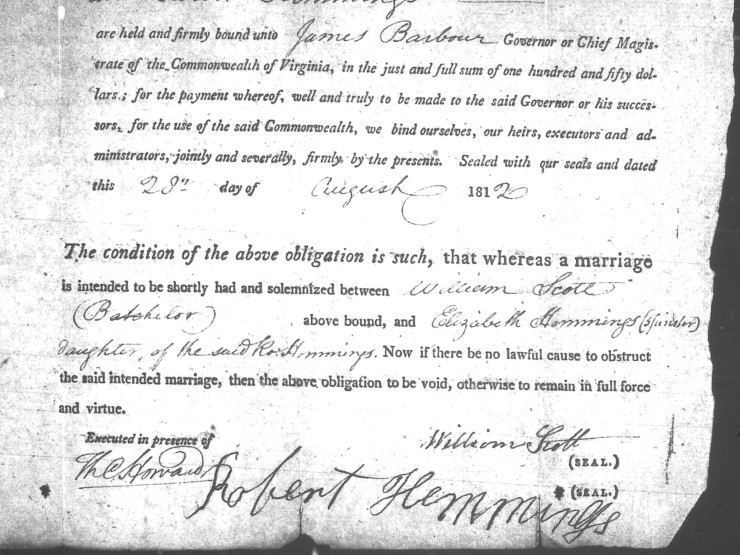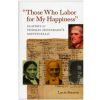
Marriage license for Elizabeth Hemmings with her father Robert's signature
Robert Hemmings (1762-1819) was the son of Elizabeth Hemings and John Wayles, Thomas Jefferson’s father-in-law and Elizabeth Hemings’s owner before Jefferson inherited her. Born in 1762, Robert Hemmings was the first of their six children.[1]
Elizabeth Hemings and her children were brought to Monticello not long after John Wayles's death in May 1773. Eleven-year-old Robert Hemmings became part of Monticello's enslaved domestic staff.[2]
By 1775 at least, Hemmings was serving as Jefferson's enslaved bodyservant, a position formerly held by Jupiter Evans. Hemmings, described as a "bright mulatto," accompanied Jefferson to Philadelphia in 1775 and 1776.[3] In 1775, he was inoculated against smallpox by Dr. William Shippen, the same physician who had inoculated Jefferson almost a decade earlier.
Until Jefferson left for France in 1784, Robert Hemmings accompanied him everywhere. An advertisement Jefferson placed in 1791 for Hemmings's position sheds light on his duties and skills: "Wanted, A Genteel Servant, who can shave and dress well, attend a gentleman on horseback, wait at table, and be well recommended."[4] Or, as Jefferson wrote a friend, he sought someone to "shave, dress and follow me on horseback."[5] Since Hemmings received some months of training under a barber in Annapolis in 1784, he may not have given Jefferson his morning shave until that time. It appears that Hemmings drove Jefferson's phaeton when the need arose.[6]
Daily association between Jefferson and Hemmings ended when they parted in Boston on July 1, 1784, when Jefferson left for France.
Hemmings returned to Virginia with Jefferson's horses and soon found employment as an enslaved servant, keeping his wages for himself. This pattern continued after Jefferson's return from France. Although Hemmings accompanied Jefferson to New York in 1790, he left after three months to find another position in Virginia.[7] Jefferson recalled him to Monticello during his vacations, often having difficulty learning his whereabouts.[8]
Robert Hemmings's reason for wishing to remain in Virginia was no doubt his wife Dolly, an enslaved woman living near Fredericksburg and later in Richmond, with whom he had two children, Elizabeth and Martin. After some years of shuttling between Monticello (or wherever he was working) and Fredericksburg and Richmond, Hemmings seized an opportunity to live permanently with his family in Richmond when it was offered in 1794.
The transaction that resulted in Robert Hemmings's freedom is not fully understood. Dr. George Frederick Stras (1746-1811), a French émigré living in Richmond, agreed to advance the purchase price of Hemmings's freedom, while Hemmings agreed to pay his debt to Stras with service. Jefferson complied reluctantly with this agreement — he thought that Robert Hemmings had been "debauched" from him and had been valued too low (£60, or $200), especially considering the loss of his service "for 11. or 12 years past."[9] The deed of manumission, which Stras kept until Hemmings paid for his freedom in service, was signed at Monticello on December 24, 1794.[10] Martha Jefferson Randolph saw Hemmings in Richmond in the next weeks: "[H]e expressed great uneasiness at having quitted you in the manner he did and repeatedly declared that he would never have left you to live with any person but his wife."[11]
Robert Hemmings, the first individual freed by Thomas Jefferson, had evidently fulfilled his agreement by 1799, when he first appears in the Richmond tax rolls. Later entries give the impression that he operated a livery or hauling business. In 1802, he lived on a half-acre lot he owned at the corner of Grace and Seventh Streets.[12] At some point, according to Isaac Granger Jefferson, Hemings "had his hand shot off with a blunderbuss,"[3] and he died in 1819.[14]
- Based on an article by Lucia Stanton, 10/90
Primary Source References
1794 December 24. (Deed of Manumission for Robert Hemmings). "This indenture witnesseth that I Thomas Jefferson of the county of Albemarle have manumitted and made free Robert Hemings, son of Betty Hemmings: so that in future he shall be free and of free condition, with all his goods and chattels and shall be discharged of all obligation of bondage or servitude whatsoever: and that neither myself, my heirs executors or administrators shall have any right to exact from him hereafter any services or duties whatsoever."[15]
1794 December 26. (Jefferson to Thomas Mann Randolph) "You will find by the inclosed that Bob’s business has been hastened into such a situation as to make it difficult for me to reject it. I had certainly thought it just that the person whom I suppose to have debauched him from me, as well as the special inconvenience of my letting him go for 2. or 3. years to come, and a total abandonment of his services for 11. or 12 years past should have been known and operated in estimating his value as a mulct on Mr. S. However all that has been kept out of view, and I have too much respect for the gentlemen who have valued him to have the subject revised. It remains therefore only to receive the money and deliver the deed, which you will find inclosed in the letter to Mr. Stras. I have made it to Bob himself, because Mr. Stras mentions it is for his freedom he is to advance the money, and his holding the deed will sufficiently secure the fulfilment of Bob’s engagements to him. When you shall have received the money, be so good as to pay £41–16 currency of it to Mr. Lyle with the sum delivered you before, and hold up the balance, as I expect in 2. or 3 posts from Philadelphia to learn whether I owe it there or am to apply it to certain purposes here. Stras’s letter and the valuation to be returned to me."[16]
1795 January 15. (Martha Jefferson Randolph to Jefferson). "I saw Bob frequently while in Richmond he expressed great uneasiness at having quitted you in the manner he did and repeatedly declared that he would never have left you to live with any person but his wife. He appeared to be so much affected at having deserved your anger that I could not refuse my intercession when so warmly solicited towards obtaining your forgiveness. The poor creature seems so deeply impressed with a sense of his ingratitude as to be rendered quite unhappy by it but he could not prevail upon himself to give up his wife and child."[17]
1795 January 22. (Jefferson to Martha Jefferson Randolph). "In my last to him [Thomas Mann Randolph] I asked the favor of him to remit the balance of Stras’s money (after taking out Mr. Lyle’s and Taylor’s) to Mr. Mussi in Philadelphia."[18]
Further Sources





